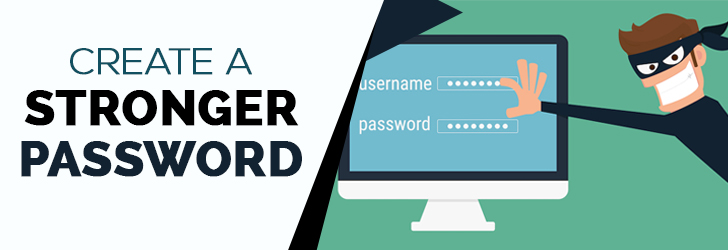
With the advent of the Internet, there are countless applications we use on a daily basis for business and personal purposes. Social media, email, cloud services, and even game applications require security and we use a password to protect our accounts. Each application makes use of a user profile to store the user's characteristics and personal information to provide more streamlined access and functionality to its users. To protect the user's account, a password was introduced and recently augmented by 2 Factor Authentication (2FA). Naturally, a stronger password means more secure account protection and we'll be looking into why this is a good thing and how we can achieve this.
Reasons for Strong Password Security
As mentioned before, the internet is a commonplace tool in today's world and as such, crimes have become quite common on it as well. Cybercrimes can come in many shapes and forms but all of them involve getting illegal/unwanted access to some account. This reason stands at the forefront for people desiring stronger passwords; if you do not use a strong password, your account may be vulnerable. Cybercrimes are no joke and these criminals have all sorts of tools at their disposal (such as password crackers, brute force attacks, and phishing scams) in an attempt to get your personal information.
We also have lesser cases that aren't quite as serious as cybercrimes, but such as the utility they offer to provide some features such as parental control on your children's internet usage. Albeit, a simple use case, having a strong password for parental controls makes it challenging for children to crack it as opposed to simply setting it as one of their birthdays.
When we lose our smart devices or leave them unprotected for a period of time is also a good reason why strong passwords should be desired. A laptop left unattended for a moment or two will likely lock itself (unless you've changed these settings) and as such, anyone cannot access it easily; not even if they know you and attempt to enter something like the name of your first pet. This is doubly important in scenarios of stolen or lost devices.
Tips for Strong Passwords
One of the easiest ways to manage your password is by using a password manager application. There are a few free options available that will generate a password for all of your online needs while keeping them on the cloud in a secure location behind one master password. As such, the master password is the only password that you would have to remember and yes, this password too should not be simple or easy to crack. Zoho, Dashlane, Password Boss, and Google Passwords are among the popular password managers that are very useful for managing your passwords.
It should be important to create a password longer than the minimum length. Password should be at least 8 characters or longer. When brute force algorithms are used to crack passwords, they usually start with shorter passwords before reaching longer passwords. This means smaller passwords are more likely to be cracked through these algorithms than lengthier passwords.
Make use of numeric and special characters also add additional security. Adding any level of complexity to the structure of your password goes a long way in making it unpredictable and harder to crack.
Avoid making a password off of recurring characters, common words, or anything relating to your personal information such as your date of birth or the year of your first car. While making the password have recurring characters makes it easier to remember; it also makes it easier to crack. Likewise with common words and even doubly so with information relevant to you. Typically; cybercriminals will try to gather your personal information through a phishing attack such as your address, the maiden name of your mother, and so on in hopes of one of these answers being the password you used or for security questions to your accounts.
Password Expiration
Microsoft and many big-name corporations included a password expiration on their applications to protect user's accounts. The idea of imposing mandatory password expiration is to protect a user from lost passwords, but a recent study found that expiring a password doesn't protect a user's account as the expiration is preset at 30 days, 60 days, or 90 days. If a user loses her password today, expiring the password in 60 days doesn't necessarily protect her account as there is always a possibility that the account can be exposed within the grace period of 60 days. Having to remember a new password requires users to jot down the clear-text password on a paper, or store them online making it vulnerable. For this reason, password expiration is fading out from new password policies.
Share this post
Leave a comment
All comments are moderated. Spammy and bot submitted comments are deleted. Please submit the comments that are helpful to others, and we'll approve your comments. A comment that includes outbound link will only be approved if the content is relevant to the topic, and has some value to our readers.

Comments (0)
No comment